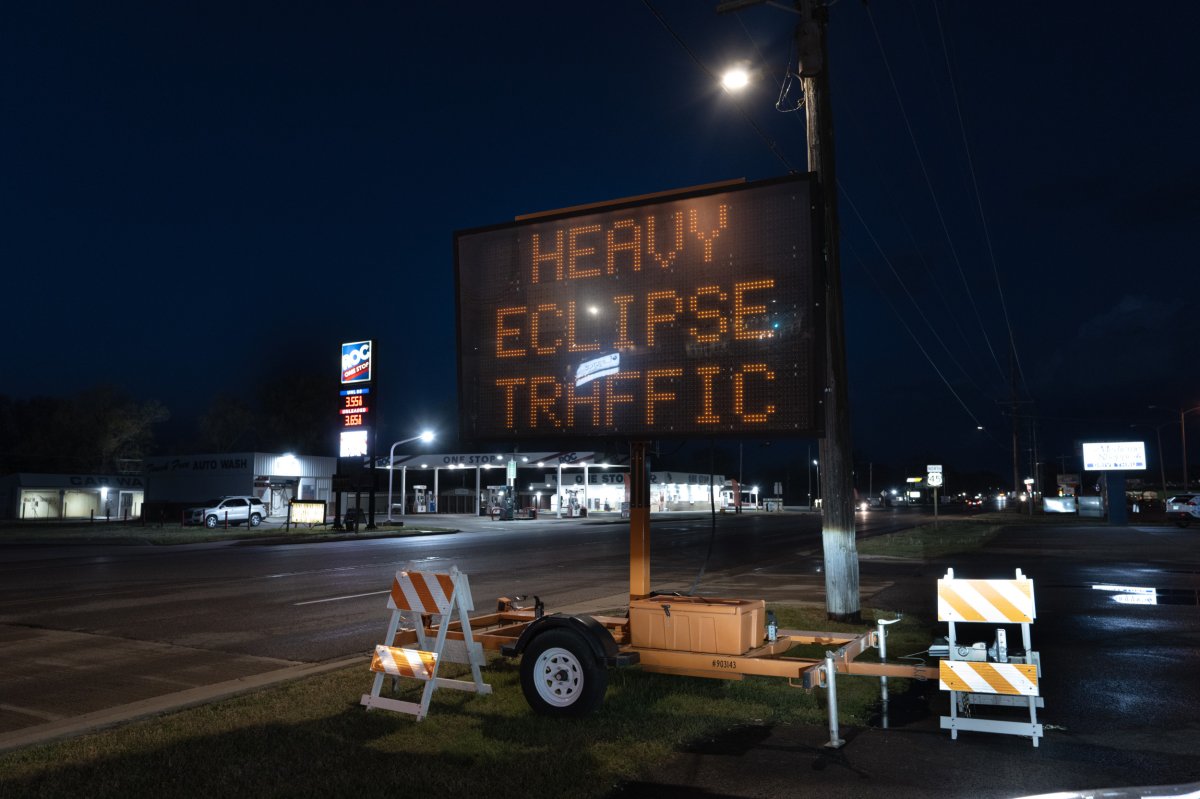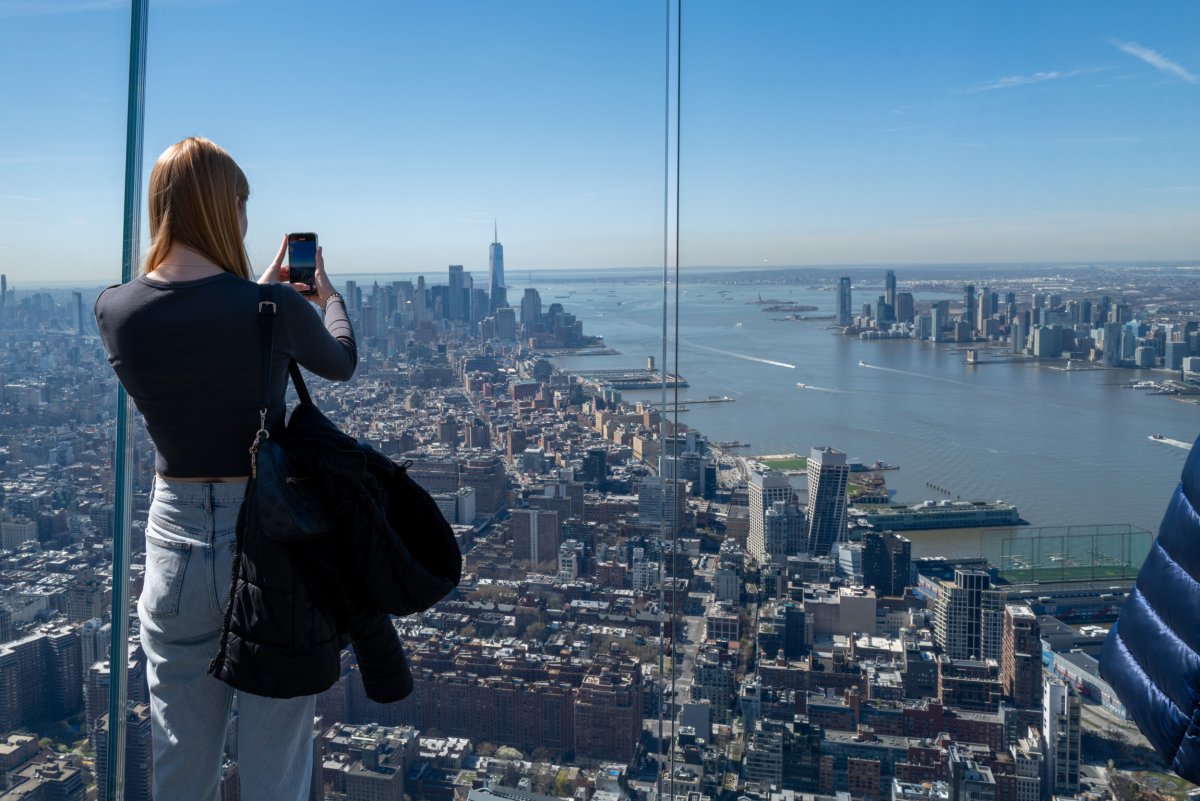Before you get on the road today, you might want to think twice ahead of this afternoon's solar eclipse.
On Monday, the moon will be positioned so that the sun's entire disc will be blocked in 13 states, plunging millions of people into darkness in the early afternoon. The path of totality will start in Mexico and extend across Texas, Oklahoma, Arkansas, Missouri, Kentucky, Illinois, Indiana, Ohio, New York, Pennsylvania, Vermont, New Hampshire and Maine before heading into Canada and over the North Atlantic.
However, the solar eclipse will likely have one huge negative effect: a surge in car accidents and traffic.
The last time America faced a total eclipse event, in 2017, there was a 31 percent increase in fatal accidents during the days around the astronomic event, a report from the Sunnybrook Research Institute and the universities of British Columbia and Toronto found.

The surge in accidents wasn't just because of the eclipse itself impacting roadways, but instead centered around the higher number of travelers on the road to experience the eclipse firsthand. On average, that accounted for one extra vehicle crash every 25 minutes and one extra crash fatality every 95 minutes.
Sunnybrook Research Institute said altogether, that gave way to 46 extra deaths on the road for the last eclipse.
Chris Hayes, the transportation risk control leader at Travelers Insurance, told Newsweek that roadway fatalities soar due to overall increased traffic that is compounded by travelers driving on unfamiliar roads. As is the case in many roadway accidents, speeding and distracted driving can increase your chances of accidents as well.
"Assume that just as we find during almost any commute, there are some drivers that may not be paying attention," he said. "We do recommend that those who can avoid driving during the eclipse do so."

If for one reason or another, you have to drive during the days of and around the solar eclipse, there are still precautions you can take. Hayes encouraged drivers to give themselves extra time before travelling.
"If you are in the car during the eclipse, don't record it or take photos of it while you are driving," he added. "If you wish to do so, pull off the road, to a safe location like a parking lot."
According to the National Aeronautics and Space Administration (NASA), 31.6 million people already live within the path of the eclipse's totality, and millions are traveling to these destinations in order to watch the eclipse occur. In 2017's eclipse, only 12 million people lived in the eclipse's path, meaning there could be an even higher surge in traffic and car accidents this year.
"This time, the stakes are even higher," Kelly Soderlund, a traveler trends expert for Navan, told Newsweek. "It's the last opportunity to see a total solar eclipse for 20 years and the path crosses a huge swath of the states. Add to that the fact that experience-driven travel is still extremely popular post-pandemic, and you've got all the ingredients to make this a major travel event."
There are also concerns when it comes to how wildlife could experience the solar eclipse and in turn impact the safety of roadways.
"Drivers should be aware that humans and our local wildlife will be experiencing the eclipse together," Zachary H. Olson, an associate professor of animal behavior at the University of New England, told Newsweek. "Deer and moose are likely to be on their feet and moving about during the eclipse, triggered by the low light conditions, and this will increase the chances of drivers encountering these animals on our roadways."
Humans themselves in search of the best way to observe or record the eclipse are also dangerous, though.
"The compelling draw of the eclipse experience seems to override safety considerations for many, leading to hazardous practices like distracted driving and stopping in unsafe areas alongside the road," B. Oak McCoy, Ph.D., assistant professor of economics at the University of New England, told Newsweek.
Hot spots for the solar eclipse's totality have already been preparing for weeks if not months as they anticipate thousands more tourists than usual.
"Events such as this can be unpredictable, especially if the destination is not prepared to accommodate a large influx of people," Rajeev Shrivastava, the founder and CEO of VisitorsCoverage, told Newsweek. "However, the general rule of thumb is that if people are going to attend an event that is temporary and the location is crowded, this may lead to unpredictable circumstances such as travel emergencies or travel delays."
Uncommon Knowledge
Newsweek is committed to challenging conventional wisdom and finding connections in the search for common ground.
Newsweek is committed to challenging conventional wisdom and finding connections in the search for common ground.
About the writer
Suzanne Blake is a Newsweek reporter based in New York. Her focus is reporting on consumer and social trends, spanning ... Read more
To read how Newsweek uses AI as a newsroom tool, Click here.






